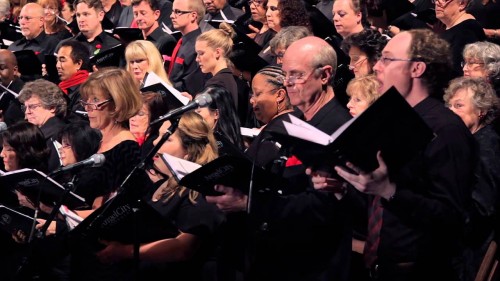Calling All Dawns: Los Angeles, June 2013
Calling All Dawns has been hailed as composer Christopher Tin’s greatest work, and is a very accomplished modern song cycle, touching on such themes as human unity, the commonality of the human experience, and the joy of life throughout the world. By combining elegant musical motifs with a choir driven tour of expression through language, and dividing it into three parts (Day, Night, and Dawn) Tin delivered a fantastic album that deserved all the praise it got, winning several Grammys. Coincidentally, it also became the first video game related piece to win a Grammy, as the album is headlined by the ever-so popular “Baba Yetu,” originally debuting in Civilization IV. “Baba Yetu” has been performed in concert several times, including in Video Games Live, but it is only recently that the whole Calling All Dawns cycle has been performed live, bringing Tin’s masterful work to several locations in the US. On June 1st, I had the distinct pleasure of attending the Angel City Chorale’s 20th Anniversary concert, which featured the west coast premiere of Calling All Dawns in Los Angeles. Not only was I treated to a fantastic concert rendition of Tin’s work, but I was also exposed to the amazing Angel City Chorale, and the intense passion the group had for this music.
As we arrived at the beautiful Wilshire Methodist Church, I began wondering how the song cycle would function in such a setting. Calling All Dawns was originally recorded at the world-famous Abbey Road Studios with the Royal Philharmonic Orchestra, and several famous artists and choirs. At first glance, seeing the music performed by a small 24 member ensemble orchestra made me feel a little uneasy. However, as soon as the concert started all my fears were assuaged. Led by founder and conductor, Sue Fink, the 140 member chorale immediately awed the audience and presented the music in an astounding and powerful fashion. It also made me realize that the main strength of Dawns was never in the orchestra, which although had plenty of impact on the album, is played more as a musical backing to the choir. The choir is the main star of Dawns, and the Angel City Chorale absolutely nailed the intensity and passion of the album, and at times even surpassed it.
The concert began with “Baba Yetu,” and immediately the church echoed and resounded with this beautiful piece of music. It became quite apparent that the natural acoustics of the church gave much more strength to both the orchestra ensemble and the choir. Soloists Frances James and Tommy Lamb demonstrated their prowess, but unfortunately didn’t sound as good as the song demanded, especially on the male vocal side of things. But the choir’s combined singing more than made up for that. As we continued with the Day cycle, we entered possibly the most pivotal song, “Mado Kara Mieru,” a Japanese sung haiku, that forms a miniature version of  Calling All Dawns’ life, death, and rebirth themes. By using four different vocalists, which each in turn “grow older,” as the song’s lyrics transition from Spring all the way to Winter, and back to Spring again, “Mado Kara Mieru” artistically reflects the song’s themes and lyrics incredibly well. The Angel City Chorale once again performed sublimely, with the song’s strongest moments being supported by the choir’s almost whisper like singing, which quickly turns into an explosive and proud sounding chant, expressing the song on the same level as the album version.
Calling All Dawns’ life, death, and rebirth themes. By using four different vocalists, which each in turn “grow older,” as the song’s lyrics transition from Spring all the way to Winter, and back to Spring again, “Mado Kara Mieru” artistically reflects the song’s themes and lyrics incredibly well. The Angel City Chorale once again performed sublimely, with the song’s strongest moments being supported by the choir’s almost whisper like singing, which quickly turns into an explosive and proud sounding chant, expressing the song on the same level as the album version.
Continuing on, “Dao Zai Fan Ye,” a short Madarin song, influenced by the mystery and enigma of the classical Dao De Jing text, was never my favorite song on the album, as it is too short and forgettable for my tastes. However, soloists Julie Athas and Carol Shih emulate the song’s sound perfectly, and the added singing from the choir, which was not as the piece originally sounded, breathes new life to “Dao Zai Fan Ye.” The next piece, however, “Se É Pra Vir Que Venha,” absolutely blew m
Do you agree with the review and score? Let us know in the comments below!
4.5
Posted on June 6, 2013 by Julius Acero. Last modified on March 1, 2014.














